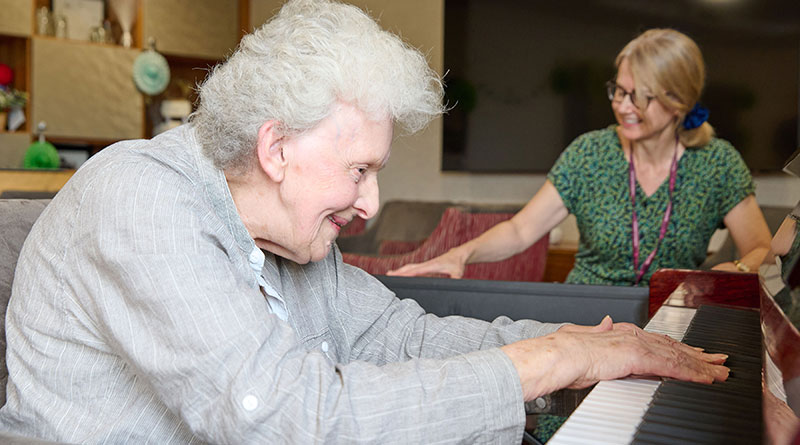
How Music Therapy is Transforming Dementia Care at Belong Warrington
When 86-year-old Val Fryer, who lives with vascular dementia, first visited Belong Warrington, she had never played an instrument and had little interest in music. Two years later, she is playing the piano weekly, supporting fellow residents to join in and describing music therapy as the highlight of her week – thanks to the home’s collaboration with Nordoff and Robbins, the UK’s largest music therapy charity.
Val’s daughter, Jane explained, “It’s just been a beautiful thing to see, because while she’s never been musical before, in terms of playing an instrument, when we leave here after the music therapy sessions, it’s a lovely journey home. She’s just so happy. We just chat about the music that mum’s played and how she feels, and she can’t believe how lucky she is.”
For Jane, the benefits extend beyond her mother’s wellbeing. “It’s changed the atmosphere at home too. Dementia is difficult, but now we have something positive to share. The joy she brings back from sessions flows through the family.”
Pam, a trained Nordoff and Robbins music therapist who has worked with Val for two years, highlighted the clinical and social impact, “Music therapy has been vital for her emotional well-being and mental health. She says it ‘lifts her up’. Dementia can lead to a huge loss of self-confidence, but experiencing yourself making a social contribution to a group is vital for self-esteem and in Val’s case, she supports those sitting next to her to play and contribute too.”
Jane recalled one particularly moving example: “There was a lady who isn’t very verbal, and Mum helped her to join in on percussion at just the right point. Afterward they smiled at each other and they touched hands in a kind of support gesture. And mum feels that lady is wanting to speak more now. I got a lump in my throat when Mum told me because she’s always been quite shy.”
For staff at Belong Warrington, the sessions have become an integral part of the home’s culture of care.
Louise Kelly, experience coordinator, said:
“Music therapy sessions have been well-received, particularly by our customers who are less able to access social connection or are non-verbal and find it hard to express themselves. We find that music and the arts help to unlock memories, reduce isolation and helps people regain a sense of identity. We’ve had some wonderful outcomes, and this is why it is so special.”
Val herself explains:
“If I’m not feeling so well, it just lifts me up altogether. I go out of here dreaming about it, I feel so lucky.”
As homes across the country continue to look for meaningful ways to improve quality of life for residents with dementia, Belong Warrington’s partnership with Nordoff and Robbins shows how music can be a powerful therapeutic tool with demonstrable impact.
For more information about Nordoff and Robbins’ work in creative health and social care, visit www.nordoff-robbins.org.uk.

